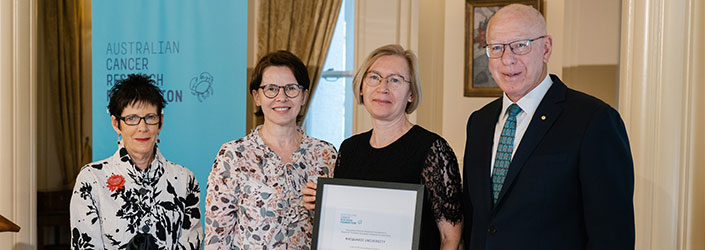Our projects

Centre research
The ACRF Centre for Advanced Cancer Modelling is focusing on these three core research themes:
Real-time selection of effective therapies using ex vivo cancer models
The inclusion of pre-clinical, real-time testing of patient-derived tissue explants and organoids has the potential to improve the success of personalised treatment approaches.
Ex-vivo tissue models can be tested for tumour sensitivity to multiple therapies, extending molecular testing and providing functional data on drug efficacy in real-time.
Research Plan: Our research team is developing ex vivo tissue models to provide response data to clinically available therapies, informed by WGS and RNA sequence data, in real time.
The research is embedded within the chemotherapy sensitivity trial (ChemoSense) – a phase II clinical trial that assesses the feasibility of personalised therapy in aggressive head and neck cancers by identifying somatic alterations that confer susceptibility and resistance to targeted therapies.
Examining mechanisms of treatment resistance and restoring treatment response
Our research team is developing and utilising relevant mouse cancer models, including syngeneic melanoma models, orthotopic CSC2 glioblastoma stem cell models (AI Shi) and xenotransplantation NOD/SCID/IL2R-/- breast cancer models.
This research theme examines several integrated aims including:
- Exploring mechanisms underlying durable immunotherapy protection from tumour recurrence
- Examining anti-cancer immune responses during treatment for immune-related adverse events,
- Identifying novel cancer vulnerabilities, and drug synergies
- Targeting resistance mechanisms and resistant organ sites with selective biomimetic nanoparticles and small extracellular vesicles, with functionalised antibodies and encapsulated Cas9/sgRNA complexes or small molecular inhibitors.
Developing predictive and prognostic biomarkers
Liquid biopsies allow for the analysis of tumours using biomarkers circulating in fluids that provide an exciting opportunity to truly deliver personalised cancer care. Circulating biomarkers allow for the dynamic molecular and biological characterisation of all tumour metastases in real-time and are easily repeatable over time.
Our internationally recognised liquid biopsy research program confirms the predictive and prognostic value of liquid biopsies. Our program involves:
- Macquarie University
- Edith Cowan University
- Melanoma Institute Australia
- Chris O’Brien Lifehouse
- Netherlands Cancer Institute.
We have also partnered with: The Australian Genome Research Facility, Qiagen, TWIST and Top Science Biotechnologies – who support this research with in-kind expertise in the development of NGS panels, pre-amplification tools and partnership pricing.
Under the ACRF Centre, this research theme includes:
- Developing unbiased amplification approaches to increase sensitivity of ctDNA in early-stage cancer.
- Implementing accurate prognostic and predictive liquid biopsy signatures for melanoma and non-small cell lung cancer.
- Developing multimodal precision liquid biopsy to predict risk of cancer recurrence and toxicity. This project will employ single molecule ctDNA detection, ctDNA methylation and detection of >700 circulating protein biomarkers in partnership with O-link.
